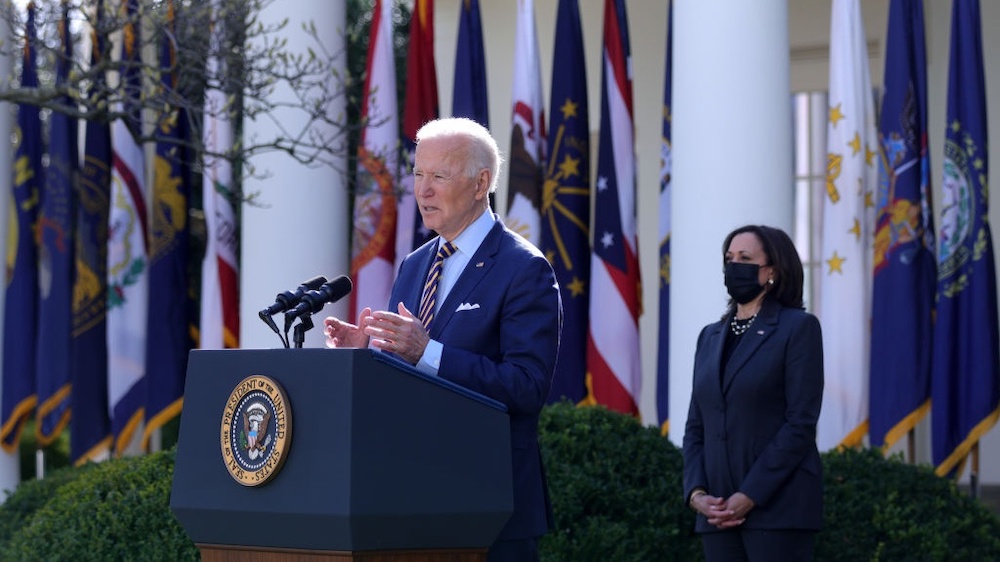If you’re interested in sharing your opinion on any cultural, political or personal topic, create an account here and check out our how-to post to learn more.
Opinions are the writer’s own and not those of Blavity's.
____
If President Biden wants to fulfill his promise to advance racial equity, he must immediately jettison dangerous policies implemented by the previous administration, who designed them to dismantle civil rights, and preserve one of our nation’s strongest tools for achieving justice — disparate impact.
Disparate impact is a legal doctrine that states a policy may be considered discriminatory if it has a disproportionate “adverse impact” against any group based on protected characteristics when there is no legitimate, non-discriminatory business need for the policy. Such characteristics are race, national origin, color, religion, sex, familial status and disability.
Civil rights laws and tools, like disparate impact, are the bedrock of justice. Fifty years ago, the Supreme Court issued a landmark ruling that changed how civil rights are enforced in this country. In Griggs v. Duke Power Co., a unanimous Court ruled that employment practices that disproportionately impact African Americans constitute discrimination in violation of the Civil Rights Act of 1964, even if intentional discrimination cannot be proven. This “disparate impact” principle has been applied to virtually all areas of civil rights enforcement since and remains the most effective tool to eliminate systemic discrimination.
This groundbreaking principle expanded the definition of discrimination beyond actions motivated by discriminatory intent. It broadened the meaning of equality by banning unjustifiable policies that appear neutral but unfairly exclude certain groups of people.
Fair housing was an immediate beneficiary of the Griggs ruling. President Nixon’s Justice Department, urged by then HUD Secretary, George Romney, employed the principle to sue the city of Black Jack, Missouri, for adopting a zoning ordinance that prohibited the construction of rental housing and adversely impacted African Americans who wished to live there. A federal court upheld the principle, writing that “[e]ffect and not motivation, is the touchstone, in part because clever men may easily conceal their motivations.” After that, every appellate court to consider the issue followed suit, and in 2015, the Supreme Court upheld disparate impact in housing.
This opened housing opportunities for communities of color, women, LGBTQ people, families with children, people with disabilities and people of faith. Families with children could challenge rental occupancy restrictions imposed by landlords. Black and brown home buyers could challenge onerous criteria in mortgage applications. Domestic violence victims could challenge eviction policies that placed them and their children at risk. The doctrine served as the backstop against systemic bias in rentals, lending, home insurance, zoning and more.
An effective civil rights enforcement tool that breaks barriers, the disparate impact doctrine has been in the crosshairs of conservatives for years. Opponents have mounted challenges to the principle and have sought to limit its application. Past administrations that were hostile to civil rights enforcement refused to rely on disparate impact as a method for proving discrimination or restricted its use, maintaining the status quo through inaction.
Last year, Trump’s U.S. Department of Housing and Urban Development (HUD) repealed the robust disparate impact regulation adopted in 2013 and issued a rule imposing overwhelming obstacles to proving discrimination, gutting its enforcement power.
Under the Trump rule, housing discrimination victims face a higher threshold for proving a claim, making it virtually impossible to succeed. The rule prioritizes corporate profits over the need to address discriminatory practices and allows companies to rely on discriminatory algorithms to determine whether people should have access to housing, loans or insurance. It also prevents discrimination victims from holding housing providers accountable for policies that perpetuate systemic racism, even as our nation calls for their end.
The Trump rule generated more than 45,000 comments from around the country, with most opposed to eviscerating the longstanding disparate impact principle. In an unprecedented move, large financial institutions objected to eroding fair housing protections, noting the nation’s heightened focus on racial injustice.
Thankfully, this damaging rule was stopped in its tracks. Three lawsuits were filed challenging the rule, including one by my organization, the National Fair Housing Alliance. In October, a federal court in Massachusetts enjoined the Trump rule before it could take effect.
We are now left to undo the damage the Trump Administration left in its wake. The Biden administration has already signaled its intention to revoke it — by announcing an unprecedented commitment to racial equity, a government-wide approach to eliminating systemic racism and directing HUD to examine Trump’s disparate impact rule.
The next step is to hastily reinstate the previous stronger disparate impact rule and then enact policies and legislation that advance fair housing. This past year shined a light on the structural inequalities that still exist, decades after federal civil rights laws were passed and interpreted by the Supreme Court. Today, it is clear the fight for civil rights is as important today as it was over 50 years ago.
If we are going to eliminate inequities, we must have all tools available, especially one as vital as the disparate impact doctrine. Let us build upon the seminal Griggs decision to truly form a more perfect union where all are created, treated and housed equally.
____
Lisa Rice is the President and CEO of the National Fair Housing Alliance.
